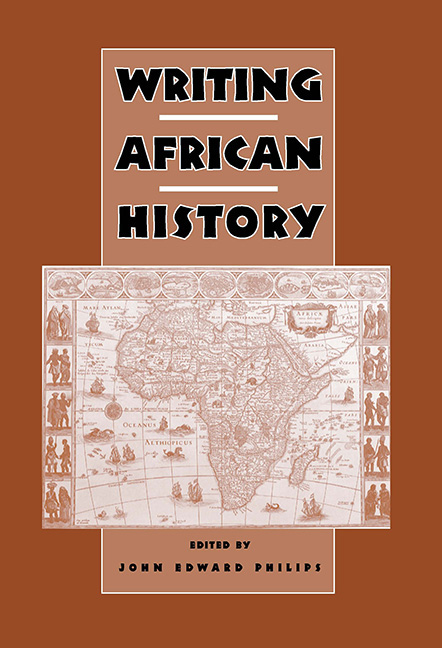Book contents
- Frontmatter
- Dedication
- Contents
- Acknowledgments
- Introduction
- Part I Background
- Part II Sources of Data
- Part III Perspectives on History
- 11 Data Collection and Interpretation in the Social History of Africa
- 12 African Economic History: Approaches to Research
- 13 Signs of Time, Shapes of Thought: The Contributions of Art History and Visual Culture to Historical Methods in Africa
- 14 Methodologies in Yorùbá Oral Historiography and Aesthetics
- 15 Local History in Post-Independent Africa
- 16 Africa and World-Systems Analysis: A Post-Nationalist Project?
- 17 “What Africa Has Given America”: African Continuities in the North American Diaspora
- 18 History and Memory
- 19 Writing About Women: Approaches to a Gendered Perspective in African History
- Part IV Conclusion
- Contributors
- Index
- Miscellaneous Endmatter
14 - Methodologies in Yorùbá Oral Historiography and Aesthetics
from Part III - Perspectives on History
Published online by Cambridge University Press: 11 May 2017
- Frontmatter
- Dedication
- Contents
- Acknowledgments
- Introduction
- Part I Background
- Part II Sources of Data
- Part III Perspectives on History
- 11 Data Collection and Interpretation in the Social History of Africa
- 12 African Economic History: Approaches to Research
- 13 Signs of Time, Shapes of Thought: The Contributions of Art History and Visual Culture to Historical Methods in Africa
- 14 Methodologies in Yorùbá Oral Historiography and Aesthetics
- 15 Local History in Post-Independent Africa
- 16 Africa and World-Systems Analysis: A Post-Nationalist Project?
- 17 “What Africa Has Given America”: African Continuities in the North American Diaspora
- 18 History and Memory
- 19 Writing About Women: Approaches to a Gendered Perspective in African History
- Part IV Conclusion
- Contributors
- Index
- Miscellaneous Endmatter
Summary
Research is about satisfying a need to know, and a need to extend the boundaries of existing knowledge through a process of systematic inquiry.
The intent of this chapter is to further satisfy a “need to know” Africa and her ethnolinguistic cultures on her own terms by exploring “how to know” her on those terms, and premising what is “knowable given those terms.” It proposes that knowing (ìmò) requires a form of research in African studies generally, and African history specifically, that finds its profundity (ìgbéèdè) in the knowledge core of the societies and cultures being studied. The chapter also suggests that Africa's terms for knowing are grounded in that which she deems permissible to know, and that which is knowable given the appropriate keys to a particular culture's world views. Yorùbá oral traditions and thought are the focus of this study which attempts, in the words of Linda Smith, to extend the boundaries of the existing knowledge of, and in this case, approaches to an oral historiography of an African people.
Some of the most insightful and useful African historical works have relied, to some degree, on the verbal and, occasionally, the visual record. The spoken word of court historians and/or artisans whose social and political responsibility was primarily to recall and record the deeds of nobility was, and is, in some societies bound by an oath of veracity as well as artistry. The Yorùbá historian, Babatunde Agiri, makes this point in his essay, “Yorùbá Oral Tradition with Special Reference to the Early History of the Oyo Kingdom.” His essay illustrates how oral sources contribute to a reconstructed history of the Oyo Kingdom, and the role of linguisitics in the corroboration of that history. Agiri's epistemological approach presents a Yorùbá based distinction between “histories of the origins (which) are called Itan Isedale, while effective history is referred to as Itan.” As he demonstrates in his essay, this linguistic analysis of specific Yorùbá oral traditions and historiography contributed substantially to the reconstruction of the migration theme in Yorùbá history. It also disclosed the narrative inlays that reference an interconnected migration history among the Mossi, the Borgawa, and the Yorùbá as well as the spread of Islam across western Africa.
- Type
- Chapter
- Information
- Writing African History , pp. 348 - 373Publisher: Boydell & BrewerPrint publication year: 2005

